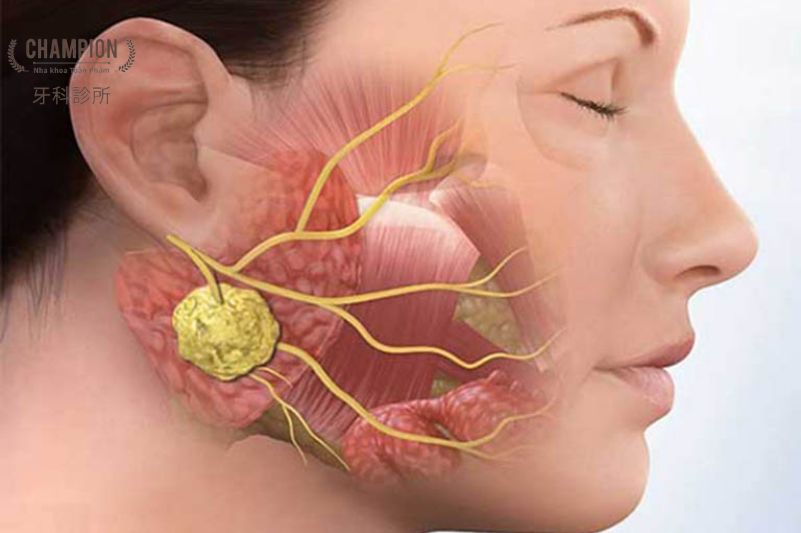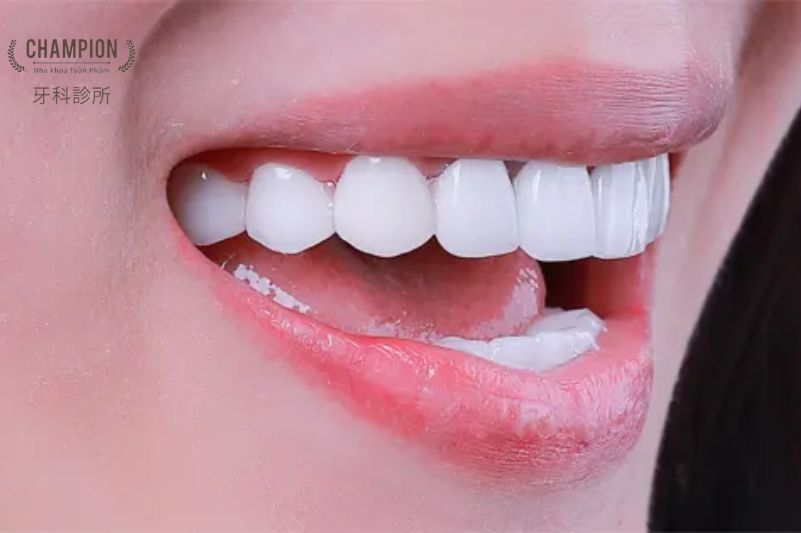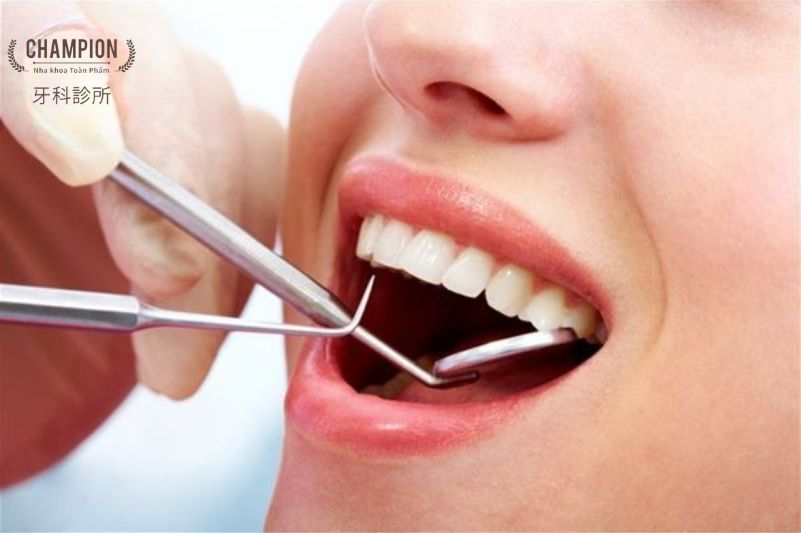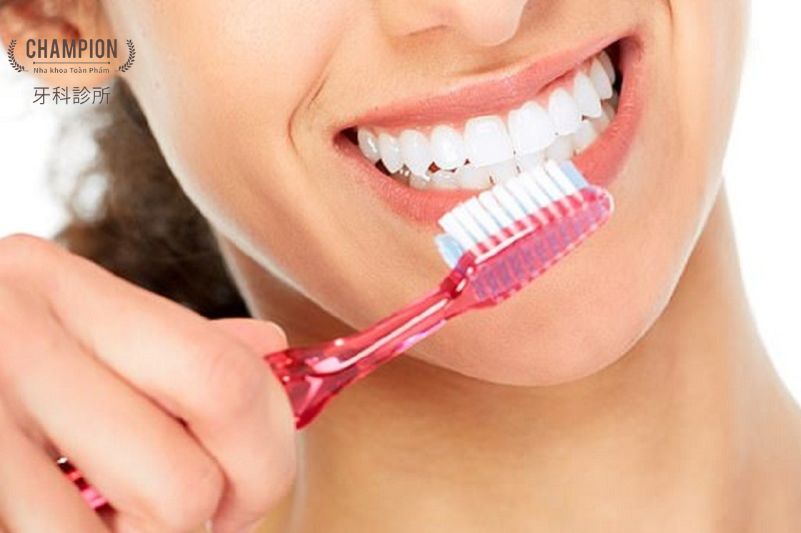Calcification of salivary glands is a condition where calcium builds up in the salivary glands, causing them to harden and reduce saliva secretion. This is a fairly common condition that seriously affects oral health. So what are the causes, symptoms, prevention methods and treatments for calcification of salivary glands? Let’s find out with Champion Dental Clinic in the following article.
Causes of Calcification of Salivary Glands
Calcification of salivary glands is a common condition in many people, especially the elderly. To better understand the pathogenesis of this disease, we need to explore the main causes leading to calcification of salivary glands.
The natural aging process that causes the body to deteriorate easily is one of the most common causes of calcification in the elderly. In addition, some diseases and unhealthy lifestyle habits can also lead to calcification of salivary glands.
Aging
Aging is a natural cause that makes the salivary glands become less functional and more susceptible to calcification in the elderly. As people age, the metabolism and cell regeneration slow down, making the salivary glands more vulnerable and prone to calcium salt deposition.
Decreased Function
In addition, some diseases such as sialadenitis, diabetes weaken the functioning of salivary glands, reducing saliva secretion, causing dry mouth, creating favorable conditions for the calcification process.
Calcium Imbalance
An imbalance in blood calcium and phosphorus levels is also a cause of calcium precipitation in the salivary glands, leading to calcification.
Drug Side Effects
Some drugs used to treat chronic diseases such as blood pressure medications, antidepressants can cause side effects like dry mouth, leading to an increased risk of salivary gland calcification.
The causes of calcification of salivary glands are quite complex, requiring thorough examination and treatment at the root to prevent recurrence.

Impacts of Calcification of Salivary Glands on Health
Calcification of salivary glands is a fairly common disease, causing many dangerous complications if not treated promptly and properly. Let's explore the negative impacts of this disease on health.
When the salivary glands are calcified, the amount of saliva secreted will decrease, causing dry mouth and difficulty swallowing. These are just the initial symptoms of the disease. If this condition persists, it will lead to more serious complications.
Dry Mouth and Lack of Saliva
Dry mouth and viscous saliva are the first and most noticeable signs of the disease. This condition causes discomfort for patients when eating and drinking.
Gum Inflammation
Due to lack of saliva, bacteria in the mouth multiply rapidly, causing gingivitis, inflamed and bleeding gums.
Tooth Decay
The ability to self-clean and protect the teeth is diminished with reduced saliva, allowing bacteria to thrive and erode tooth enamel, causing cavities.
Sialadenitis
Due to calcium accumulation, the salivary glands become inflamed, damaged, and cause pain in the jaw and facial area.
Impacts on Nutrition
These symptoms also greatly affect the ability to eat and drink, causing loss of taste and weight loss. If this condition persists, it will be very dangerous.
Therefore, if there are any abnormal signs from the mouth, patients need to see a doctor for timely examination and treatment, to avoid the disease becoming more serious.

How to Prevent Calcification of Salivary Glands
Calcification of salivary glands is a common disease, causing many dangerous complications if not detected and intervened in time. Below are some simple but effective ways to help prevent calcification of salivary glands:
Oral Hygiene Habits
Brushing properly twice a day, using dental floss, and rinsing mouth regularly will help remove plaque and prevent bacteria formation. This is the simplest but most effective way to prevent calcification of salivary glands.
Regular Dental Checkups
Having dental checkups every 6 months will help detect early signs of abnormalities in the teeth and mouth for timely intervention.
Healthy Diet and Lifestyle
Limit stimulants, alcohol, coffee. Increase green vegetables, fruits, healthy foods rich in vitamins and minerals. Drinking 2 liters of water every day also helps prevent the risk of dry mouth.
Treating Related Diseases
Thoroughly treating diseases such as hypertension, diabetes, reduced saliva secretion, etc. also helps reduce the risk of disease.
Timely Treatment of Abnormal Signs
When there are signs of dry mouth, viscous saliva, it is necessary to see a doctor immediately for examination and timely treatment to prevent the calcification condition from becoming more severe.

>> See more: Calcification of Salivary Glands: Causes, Symptoms and Treatments
Treatment Methods at Champion Dental Clinic
Calcification of salivary glands is a common condition that can cause dangerous complications if not treated promptly. Understanding the importance of thoroughly treating this condition, Champion Dental Clinic has applied many modern treatment methods to quickly and effectively remove calcified deposits.
Laser Technique
Using laser beams can detach calcified deposits without causing pain to patients. The laser precisely targets the affected area, eliminating calcium accumulation without damaging surrounding tissues.
Anesthetic Gland Irrigation
The doctor will inject anesthetics into the treatment area so that the patient does not feel pain. Then, a solution capable of dissolving calcified deposits is sprayed to thoroughly wash the salivary glands.
Gland Removal Surgery
For severe calcification cases that cannot be treated with laser or irrigation, the doctor will perform surgery to completely remove the calcified gland.
In addition, we also combine many supportive treatments such as changing diet, massaging to stimulate salivary glands, etc. to help achieve optimal treatment results.

Q&A to Address Concerns
Question: Can calcification of salivary glands be cured?
Answer: Calcification of salivary glands can be completely cured if detected and treated early. Depending on the level of calcification, the doctor will have appropriate treatment methods to remove calcified deposits and restore salivary gland function.
Question: I have calcification of salivary glands, what should I eat and avoid?
Answer: People with calcified salivary glands should supplement foods rich in calcium such as milk, fish, beans... to balance calcium and prevent calcification. Avoid carbonated drinks, stimulants, spicy foods that irritate the oral mucosa.
Question: How long does it take for calcification of salivary glands to recur?
Answer: Typically, calcification of salivary glands can recur within 6-12 months if the patient does not change their diet, lifestyle, and does not thoroughly treat underlying diseases. Therefore, after treatment, patients need to follow post-surgery regimens and have periodic check-ups for health monitoring.
Conclusion
Calcification of salivary glands is a common condition that seriously affects oral health if left untreated. However, with timely detection and intervention using modern methods, the disease can be completely cured.
Hopefully through this article, readers have gained the necessary knowledge to prevent as well as treat symptoms of calcified salivary glands. Remember to have regular checkups to ensure your oral health is always in optimal condition.
Vietnamese & English: (028) 5411-2295
中文: (028) 5411-2297 172 Nguyen Luong Bang, Tan Phu Ward, District 7, Ho Chi Minh City.
Fanpage: Champion Dental Clinic 牙科診所
Zalo: Champion Dental Clinic
Youtube: Champion Dental Clinic 牙科診所
 Champion Dental Clinic
Champion Dental Clinic



